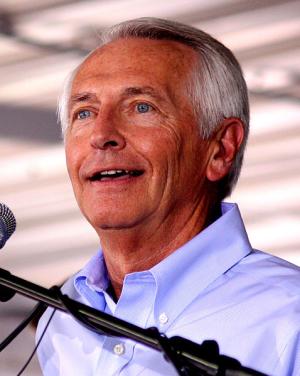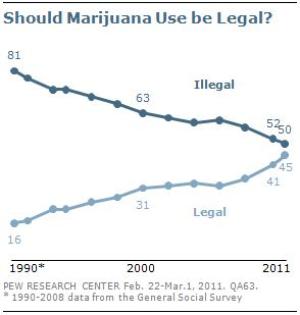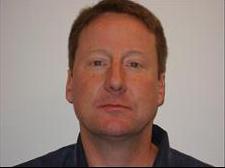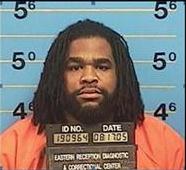Faced with a staggering corrections budget, Kentucky has become the latest state to enact substantive sentencing reforms.
It's been more than a year since medical marijuana became the law of the land in New Jersey, but the fight goes on.
A former Mexican governor admitted that the previous PRI government negotiated deals with drug cartels to keep the peace. Was that a better strategy than what Calderon is doing now?
Here's yet another public opinion poll showing a rising trend-line for freeing the weed.
Washington could be the next medical marijuana state to allow dispensaries after a bill to do so passed the state Senate. It now goes to the House.
MedicalMarijuana.ProCon.org, part of the ProCon.org family, is an in-depth web site presenting information and views from a variety of perspectives on the medical marijuana issue. The Chronicle is running a series of info items from ProCon.org over the next several weeks, and we encourage you to check it out.
A second deputy US marshal has been killed trying to apprehend a drug suspect this year. The fugitive was also killed. They are the year's 14th and 15th deaths related to drug law enforcement.
Being the subject of a drug search warrant proved fatal for a young Massachusetts man last Friday.
It's a veritable cornucopia of drug-related law enforcement corruption! We don't even know where to begin -- just jump in, but don't forget to take a shower after you're done.
The disaster that is Mexico's drug war has moved a Council on Foreign Relations scholar to call for the US to rethink its failed drug policies.
Scotland's Liberal Democrats want to reduce the harm to users and society alike by making heroin available through prescription.
Events and quotes of note from this week's drug policy events of years past.
Kentucky has become the latest state to enact sentencing reforms in a bid to rein in skyrocketing corrections costs. Gov. Steve Beshear (D) last Thursday signed into law HB 463, a comprehensive corrections bill that will save the state millions of dollars a year, in part by sentencing drug possession offenders to probation instead of prison.

Kentucky Gov. Steve Beshear (Image courtesy Gage Bradshaw)
The bill was based on a multi-year collaboration between the Pew Center on the States
Public Safety Performance Project and state officials. State officials and legislators working with the project convened a Task Force on the Penal Code and Controlled Substances Act and issued a
January report that was the basis for the legislation.
"This overhaul of Kentucky's penal code is the result of a multi-year effort involving members of the executive, legislative and judicial branches," said Gov. Beshear. "Over the last three years, we've made headway with aggressive efforts to bring common sense to Kentucky's penal code, and our prison population has dropped each of the past three years. House Bill 463 helps us be tough on crime, while being smart on crime."
The new law calls for sentences of "presumptive probation" for small-time drug possession offenders, meaning they will get probation unless judges can offer a compelling reason why they should go to prison. It also calls for drug treatment to be made available for drug offenders. It reduces penalties for small-time drug dealing while increasing penalties for large-scale trafficking. And it shrinks "drug-free" zones from 1,000 yards to 1,000 feet.
The law also reduces sentences for small-time drug dealing. Sales of less than four grams of cocaine, two grams of heroin or methamphetamine, or 10 dosage units of other controlled substances will be reduced from a Class C felony to a Class D felony.
"Today, if you sell half a gram of rock cocaine, that's a Class C felony," said Van Ingram, director of the
Kentucky Office of Drug Control Policy. "When the new law goes into effect in 90 days, you will have to sell more than four grams to get Class C. That means instead of a five-to-ten-year sentence, you'll be looking at one-to-five," he told the Chronicle.
The new law lowers possession of less than an ounce of marijuana from a Class A misdemeanor worth up to a year in jail to a Class B misdemeanor with a maximum sentence of 45 days in jail, if any jail sentence is imposed.
It also requires reforms of the probation and parole system. It will create "graduated sanctions" for parole violators, allowing authorities to impose short jail stays instead of sending them back to prison for technical violations. And it removes drug offenses from consideration when judges impose sentencing enhancements based on previous felony convictions.

Roderer Correctional Complex
Although crime rates have remained steady or dropped, Kentucky's prison population has increased fourfold in the past two decades, from 5,000 in 1990 to more than 20,000 now. Drug offenders account for 25% of the prison population, but 38% of inmates admitted since 2000. The state's corrections budget this year is $460 million, and Kentucky is set to save nearly that much over the next decade by implementing the new sentencing structure.
"Of all the problems I inherited, this is one of the most complex," Gov. Beshear said. "In early 2008, I directed Justice & Public Safety Secretary J. Michael Brown to convene the Criminal Justice Council and report back on recommendations for curbing the rising prison population. That report, and the work of subsequent work groups, provided the groundwork for much of these reforms."
"This bill takes major steps to both decrease recidivism while addressing the unique problems Kentucky faces with substance abuse in ways that absolutely enhance public safety," said Brown.
"House Bill 463 is landmark legislation not only for the positive changes it proposes for our penal code, but also for the manner in which it became law," said Speaker Greg Stumbo. "Anytime you can bring together as many diverse groups as this bill did, and have them agree, you're on to something special. Rep. John Tilley and Sen. Tom Jensen did a tremendous job in getting this bill to the finish line."
"It is the most significant and meaningful piece of legislation that I have had the privilege to work on since being elected to the state legislature," said Sen. Tom Jenson, chairman of the Senate Judiciary Committee. "I am pleased that the Task Force on the Penal Code and Controlled Substances is going to continue studying these issues. We have gotten off to a great start and we need to continue working to make things better where we can."
"I'm pleased we're making progress in tackling the problems facing our penal code," Chief Justice of Kentucky John D. Minton Jr. said. "With all three branches involved in this deliberative process, I'm confident that the outcome will be positive for Kentucky."
"Senator Jensen, Representative Tilley, Senate President Williams and House Speaker Stumbo worked across party lines to look at the data and forge a comprehensive package of reforms that will get Kentucky taxpayers a better public safety return on their corrections dollars," said Richard Jerome, project manager of the Pew Center on the States Public Safety Performance Project. "The legislation employs research-based strategies to reduce recidivism, hold offenders accountable and maximize the state's limited financial resources."
Sentencing reforms are becoming increasingly popular as cash-strapped states face ever increasing budget pressures. South Carolina, Colorado, New York, and Texas are among states that have reformed sentencing and other corrections practices to lower imprisonment rates and save money. Similar efforts are pending in Delaware, Florida, Indiana, Massachusetts, Ohio, and Pennsylvania.
Sentencing reforms don't end drug prohibition, but they do somewhat reduce its inhumanity and its costs to society, as well as to the people busted for drug offenses. That's a start.
back to top
More than a year after then Gov. Jon Corzine (D) signed New Jersey's Compassionate Use Act into law, it has yet to be implemented. Corzine's replacement, Gov. Chris Christie (R) first delayed implementing the program, then his Health Department promulgated draft regulations that the medical marijuana community and the legislature consider to be against both the spirit and the letter of the law.

Gov. Chris Christie (R) and bill sponsor Assemblyman Russ Gusiora (D)
It's unclear what will happen next. The Christie administration is moving forward with implementation, saying it is accepting applications for dispensaries, or alternative treatment centers (ATCs), although it won't name the applicants. But the legislature may move to invalidate all or part of the regulations, and if it does that, it isn't clear what that will mean for the program, either.
While the Assembly sponsor of the bill, Assemblyman Reed Gusciora (D), came to an agreement with Christie in December, the Senate sponsor, Sen. Nick Scutari (D) remains unhappy with the regulations. A call to his office Wednesday about his intentions had not been returned by press time.
The New Jersey medical marijuana law was already the most restrictive in the nation before the Christie administration moved to make it even more so. It allows patients suffering from certain debilitating and life-threatening illnesses such as cancer, HIV/AIDS, and multiple sclerosis to use and possess medical marijuana with a doctor's recommendation. It calls for the licensing of ATCs where qualifying patients could safely access medical marijuana. Patients cannot grow their own medicine.
A public hearing on the proposed regulations Monday saw almost unanimous condemnation of the regulations, as patients, providers, advocates, and family members lined up unleash volleys of criticism at the proposed rules. Only one person, a spokesman for Meadowlands Hospital in Secaucus, which has applied for an ATC permit, applauded the rules.
More typical was multiple sclerosis patient Sandy Faiola of Asbury Park. Riding a scooter to the microphone, Faiola asked why the state wants to limit the potency of medical marijuana to 10% THC, well below the levels obtained in medical marijuana strains used in other states.

Sen. Scutari and patient/activist Mike Oliveri after the January 2010 vote (cmmnj.org)
"Cannabis with THC levels of 10% or less may help some patient's needs, but not mine," she said. She also criticized a proposed $200 fee for caregivers as "excessive," especially since all caregivers can do in New Jersey is retrieve a housebound patient's medicine from the ATC. "My primary caregiver already spends many hours a month helping me do things like travel to appointments and pick up medicine, food and other things I need. Asking her to also pay $200 for a New Jersey permit in order to help me get this medicine is wrong," Faiola said.
"These regulations are unconstitutional; they are arbitrary and capricious," said attorney Justin Escher Alpert, a patient from Livingston. "They are against the spirit of the law."
"There's a big difference between ensuring that only qualified patients have access and ensuring that qualified patients do have access," said Jim Miller, whose late wife Cheryl died of multiple sclerosis and used medical marijuana for relief.
But while the public hearing sent a powerful message to the Christie administration, it is not clear that anyone is listening. Health Department representatives at the hearing took no questions, and the department has said only that it will review the testimony before making the regulations final in April.
"It's very disappointing," said Roseanne Scotti, head of the
Drug Policy Alliance New Jersey office. "I don't know if the health department heard what got said, but they certainly got an earful."
"We don't expect any changes to come out of that hearing," said Ken Wolski, director of the
Coalition for Medical Marijuana-New Jersey. "The administration has demonstrated pretty clearly that Gov. Christie is making the decisions, and it doesn't really matter what we say."
"We hope the legislature will continue to follow through with what they started in December, when they passed resolutions saying the regulations were not consistent with the spirit or the the letter of the law," said Wolski. "The next step is for them to invalidate all or part of those regulations. We've already told the legislature exactly what is unacceptable."
"The administration is saying it isn't going to change anything, so the only thing that would radically change the regulations is if the legislature takes the next step and moves to invalidate them," said Scotti. "There is probably something going on behind the scenes between the administration and Scutari, but we don't have a definite answer on whether they will move to invalidate."
It is also unclear what would happen to the program if the legislature does move to invalidate some or all of the regulations. As noted above, the health department is taking applications for ATCs and will soon begin registering patients, so the program is moving toward implementation, even if it is badly flawed.
"We don't have a clear answer as to how this might play out," said Scotti. "The legislature can rewrite the regulations if they choose to, but they would still have to go through a process, and it could be a huge fight between the administration and the legislature. It could end up in a huge court battle."
"There is a provision in New Jersey law that would let the legislature invalidate part of the regulations," said Wolski. "If you took out the unacceptable parts, you would wind up with a much better program. It's incumbent on the legislature to really take charge here and show the department what are acceptable regulations."
"We are continuing to do everything we can to make our voices heard, we've turned out large numbers of people, but its looks like it's going to be a much longer battle than we thought it would be last January," said Scotti.
back to top
by Bernd Debusmann, Jr.
[This article updates a version that was published on our web site a week ago, but after the email edition had already been distributed. It includes Mexico drug war information from the last two weeks, as opposed to the usual one week.]
Mexican drug trafficking organizations make billions each year smuggling drugs into the United States, profiting enormously from the prohibitionist drug policies of the US government. Since Mexican president Felipe Calderon took office in December 2006 and called the armed forces into the fight against the so-called cartels, prohibition-related violence has killed more than 36,000 people, including more than 15,000 last year. The increasing militarization of the drug war and the arrest of dozens of high-profile drug traffickers have failed to stem the flow of drugs -- or the violence -- whatsoever. The Merida initiative, which provides $1.4 billion over three years for the US to assist the Mexican government with training, equipment and intelligence, has so far failed to make a difference. Here are a few of the latest developments in Mexico's drug war:

Prohibition creates an endless supply of hot guns and cold cash. (Image via Wikimedia)
In Zapopan, Jalisco,
a senior police commander and his wife were shot and killed when his vehicle was ambushed by heavily armed gunmen. Jesus Quirarte Ruvalcaba was the commander of a state police unit which specializes in car thefts. Car theft in Mexico is often related to or controlled by drug trafficking organizations.
In Houston, Texas,
a police officer was wounded after being shot in a raid on the home of a suspect with ties to a Mexican drug cartel. The officer is in good condition. A suspect was also wounded after being hit by gunfire and is in good condition.
In Saltillo, Coahuila,
a former governor admitted that the previous PRI administration had controlled and negotiated with drug trafficking organizations, which kept violence manageable. Former Nuevo Leon Governor Socrates Rizzo is the first former PRI official to speak this openly about party deals with drug trafficking organizations, although it has long been well-known in Mexico.
Saturday, February 26
In Torreon, Coahuila,
13 people were died and at least 18 were wounded in two separate attacks on bars in the city.
Sunday, February 27
In Saltillo, Coahuila,
a Zeta commander was captured. He is alleged to be connected to the incident in which two American ICE agents were shot -- with one killed -- in early February. Sergio "El Toto" Mora is accused by Mexican authorities of being the regional Zetas commander in the state of San Luis Potosi. At least nine other arrests have been made in connection with the shooting of the ICE agents.
In Ciudad Juarez,
11 people were killed in several incidents in the city. In one incident, five men were killed when gunmen attacked a bar the Colonia Villa Esperanza area of the city. In another part of the city, a man was found murdered in a house where we had apparently been held hostage.
Monday, February 28
In Juarez,
eight people were murdered in several attacks across the city. In one incident, four people, including a ten-year old boy, were killed when their car was attacked by gunmen. A five-year was severely wounded. Saturday's killings bring the total number of dead in the city to approximately 229 for the month of February, 36 percent are females. This is about a 40 percent increase over the same time period of 2010.
In Dallas, Texas,
three suspects were arrested after police linked them to the weapon used in the recent killing of an American ICE agent in San Luis Potosi.
In Chilpancingo, Guerrero,
a police chief was ambushed by gunmen armed with AK-47s. The police chief, Humberto Velazquez Delgado, was wounded and four of his bodyguards were killed. Approximately 400 shell casing from AK-47 rounds were found at the scene.
Tuesday, March 1
In Guerrero,
17 bodies were discovered in two clandestine graves near the town of San Miguel Totolapan. This is the third time mass graves have been discovered in Guerrero in less than a year. Additionally, four bodies were found dumped on the highway between the coastal city of Acapulco and Mexico City.
In Tamaulipas,
eight gunmen were killed in a fire-fight with Mexican marines near the town of Valle Hermoso, which is close to the US border.
In Washington,
a top law enforcement officer announced that 678 gang members, many of whom have ties to Mexican drug trafficking organizations, have been arrested during a two-month operation, called "Operation Southern Tempest." Approximately have the suspects -- which came from 113 different gangs around the country -- have ties to drug trafficking groups, and two-thirds are foreign nationals.
Wednesday , March 2
Near Phoenix, Arizona,
police said that the decapitation of a local man in October is related to Mexican cartel activity. Martin Alejandro Cota Monroy, 38, was allegedly killed by a three-man team for ripping off a 400-pound load of marijuana. One of his killers is in custody. According to police, Monroy first told the cartel that his load had been confiscated, and then, when they found out, offered his house as collateral until he could pay his debt. He was killed after they found out he didn't own the house. The killers are thought to have moved in next door to befriend Monroy before killing him.
In Ciudad Juarez,
nine people were murdered.
Sunday, March 6
In Mexico City,
Mexican officials asked for clarification on an ATF operation which allowed American guns to flow to Mexico in an effort to track the supply lines of weapons to Mexican cartels. Among the guns were two AK-47's that were used in the attack on the ICE agents in February.
In Ciudad Juarez,
13 people were murdered in several incidents across the city. At least three of the incidents had more than one victim. In one attack, three men were killed after gunmen sprayed a bar -- which is within sight of the US consulate -- with gunfire. Four others were wounded. In another incident, five people, including one woman, were found executed. These killings bring the death toll in Juarez for the first six days of March to 31. The total for the year is 494, including at least 55 females.
Monday, March 7
In Abasolo, Tamaulipas, a gun battle between rival cartel gunmen
left 18 people dead. The battle was almost certainly between members of the Gulf Cartel and their former enforcers, the Zetas, who have been at war for just over a year now.
Near Guasave, Sinaloa,
gunmen attacked a police convoy, killing seven police officers and one prisoner. The attack was an apparent attempt to rescue one or both of two prisoners who were being transported to the state capitol of Culiacan. Over 1,200 rounds were fired during the attack.
Tuesday, March 8
In Chilpancingo, Guerrero,
three government offices were attacked by assailants, who doused the offices in gasoline and set them on fire. The motive for the attack is unclear, but the area has high levels of drug related violence.
In Texas, officials announced that the 20-year old female police chief of the Mexican town of Praxedis G. Guerrero is seeking asylum in the United States, apparently after having received threats. Marisol Valles Garcia made
international headlines when she took the job. The local government has fired her for abandoning her post. Local police will answer to the Mayor until a replacement can be found.
In Mazatlan, Sinaloa
, armed men attacked a nightclub with automatic weapons. At least twenty people were wounded in the attack. The gunmen managed to escape, despite the fact that police and army units were nearby
Wednesday, March 9
In San Luis Potosi,
Mexican authorities arrested another suspected Zeta thought to be involved in the February 15 incident in which a US ICE agent was killed. Mario Jimenez Perez, 41, is alleged by Mexican authorities to be in charge of Zeta financial operations in San Luis Potosi, where the attacks took place.
Total Body Count for last Week: 88
Total Body Count for this Week: 52
Total Body Count for the Year: 1,315
Total Body Count for 2010: 15,273
Total Body Count for 2009: (approx.) 9,600
Total Body Count for 2008 (approx.): 5,400
Total Body Count for 2007 (approx): 4,300
Total Body Count for Calderon's drug war through 2010: 34,849
Total Body Count for Calderon's drug war to date: 36,164
back to top
Public support for marijuana legalization continues its upward trend and has "never been higher," according to a new poll from the Pew Research Center for the People and the Press. The poll had support for marijuana legalization at 45%, up four points from the same poll a year earlier.

pew-poll-compilation.jpg
Half of respondents (50%) still opposed legalizing pot, but that number is down two points from last year and continues a two-decade long trend of declining opposition. In 1990, 81% opposed legalization; by 2000, that number had declined to 63%, and has continued to drop since then.
The upward trend line for legalization and the downward one opposing legalization are nearing the convergence point, and support for legalization will soon surpass opposition, if current trends continue.
Pro-legalization sentiment was strongest among 18-to-29-year-olds (54%), Democrats (53%), and people with some college education (50%). Among liberal Democrats, support rose to 66%.
Keeping marijuana illegal got the strongest support from Republicans (67%) and people over 65 (66%), and women (54%). Men were evenly divided on the issue.
The new Pew poll is in line with other polls in recent years showing a steady increase in support for marijuana legalization, but that we're not quite there yet nationally. Still, we are getting tantalizingly close. You can review our archive of Chronicle articles about polls
here.
back to top
The Washington state Senate last Wednesday night approved a bill that would allow for licensed medical marijuana dispensaries on a vote of 29-20. The bill, SB 5073, was approved only after lengthy debate and after several amendments opposed by supporters were adopted.

Moving toward dispensaries in the Evergreen State (Image via Wikimedia)
Under Washington's existing medical marijuana law, patients or caregivers can grow their own medicine, but there is no provision for sales. But not every patient can grow his or her own medicine, and some patients have formed collectives to grow cooperatively. Others have gone further, forming dispensaries that serve hundreds or even thousands of patients.
Since state law does not provide for dispensaries, some prosecutors have gone after them. The state itself sends mixed signals, with the Health Department saying they're not legal, but the Revenue Department seeking sales taxes from them.
The measure authorizes the Department of Health to license dispensaries and the Department of Agriculture to license growers. It also creates a registry when authorized users can enroll, providing them with greater protection from prosecution.
"My intention is to ensure patients who are qualified have safe, secure reliable source for the medication that works for them," said Sen. Jeanne Kohl-Welles (D-Seattle), one of the bill's sponsors.
The bill passed the Senate only after being amended to require dispensaries to be nonprofits, to ban dispensary advertising in newspapers, and to give municipalities the power of approving dispensary locations.
The measure now heads to the House. The House companion bill is
HB 1100.
back to top
Fifteen states and the District of Columbia have medical marijuana laws, and they have enacted a variety of laws, fees and possession limits to regulate it.
Read the details at 15 Legal Medical Marijuana States and DC -- Laws, Fees, and Possession Limits, on the web site medicalmarijuana.procon.org, part of the ProCon.org family.
Follow Drug War Chronicle for more important facts from ProCon.org over the next several weeks, or sign up for ProCon.org's email list or RSS feed.
ProCon.org is a web site promoting critical thinking, education, and informed citizenship by presenting controversial issues in a straightforward, nonpartisan primarily pro-con format.

back to top

Deputy US Marshal John Perry (ksdk.com)
A deputy US marshal and the fugitive he was trying to arrest were
killed Tuesday in a gun battle in St. Louis. They become
the 14th and 15th people killed in US drug law enforcement operations so far this year.
Deputy US Marshal John Perry, 48, was shot in the head and died later at a local hospital. A second US marshal and a St. Louis police officer were shot and wounded.
All three were shot by the fugitive they were seeking, Carlos Boles, who had a long history of drug and other offenses and who was wanted on charges of drug possession, resisting arrest, and assaulting an officer. Boles was shot and killed at the scene by officers returning fire.

Carlos Boles (13wmaz.com)
Boles had at least 12 criminal convictions and had served time for drug offenses and assault. The St. Louis Police Violent Offenders Unit had asked for help from the US marshals because Boles "could pose a threat to law enforcement officials," the department said.
Perry becomes the second deputy US marshal to be killed attempting to serve arrest warrants on fugitive drug offenders so far this year. Last month,
Deputy US Marshal Derek Hotsinpiller, 24, was killed in West Virginia under similar circumstances.
back to top
A 21-year-old Fall River, Massachusetts, man died last Friday afternoon shortly after police executing a search warrant in a drug investigation entered his apartment. It was the 13th death to occur during a drug law enforcement operation so far this year in the US, and the third in Massachusetts.

Fall River Police Department
Police told the
Fall River News that detectives with the Vice and Intelligence Unit were executing the search warrant when they encountered the man. As for the circumstances of his death, police said only that "detectives located the man and at some point he went into cardiac arrest." At some point, police called paramedics, but he was later pronounced dead at Saint Anne's Hospital.
Police did not name the man, but a poster in the comments section of the article linked to above identified him as Dennis Mendez, 21. The anonymous poster, writing under the user name
Kei24, appeared to say that Mendez had tried to swallow drugs and choked to death as police stood and watched.
"My brother was struggling to get away from the police,"
Kei24 wrote. "He wasn't fighting them they did find somethin but no one was charged... we was begging the police to help him because his hand, feet and lips were purple and they just kept saying that he was fine and the drugs that he was trynna swallow was pulled out of his mouth once paramedics got there my brother was dead in less then 2 mins that the police broke down the door they just made jokes about it and were saying he was fakin it... He was human just like the rest of us and they treated him like a dog."
But in a Tuesday interview with
WPRI Eyewitness News, Mendez' sister, Keila Lebron (
Kei24), said that while Mendez had swallowed crack cocaine, that's not what killed him. "She claims officers immediately began beating him, and Mendez lost consciousness," the station reported.
Fall River Police said the Massachusetts State Police Major Crimes Division, the District Attorney's Office, and the State Medical examiner will conduct an inquiry into the death.
back to top
It's a veritable cornucopia of drug-related law enforcement corruption! We don't even know where to begin -- just jump in, but don't forget to take a shower after you're done. Let's get to it:

evidence room of opportunity
In Philadelphia, a
narcotics cop accused of stealing money from people he stopped has been fired after the
Philadelphia Daily News published those allegations. Officer Joseph Sulpizio, 42, had been looking at criminal charges, but Police Chief Charles Ramsey said that now wouldn't happen because the news article "blew the investigation." It was unclear how the
Daily News article actually prevented the prosecution.
In San Francisco,
six narcotics officers have been accused of illegal searches and perjury by the San Francisco Public Defender's Office, which has released a video it says proves its case. In two separate drug busts at apartments in the Henry Hotel in December and January, police without search warrants entered the apartments and arrested the occupants on drug sales charges. Police said they had informant tips and hot gotten consent to search from the residents. But videos captured by hallway surveillance cameras showed that an officer had used a master key to enter the apartments without the consent of the residents. Last week, a San Francisco Superior Court judge threw out one case, and prosecutors dropped the second one the next day. The public defenders are calling for an additional independent investigation of the incidents, perhaps by the state attorney general's office.
In Buffalo, New York,
a Transportation Security Administration agent was arrested March 2 on charges he allowed a "drug kingpin" to pass unmolested through security at the Buffalo Airport. TSA agent Minetta Walker, 43, a behavioral detection officer, is also accused of helping other drug traffickers evade scans and searches to take cash -- but not drugs -- through the airport. She was arrested along with the "kingpin," a Buffalo man who regularly flew to Arizona with large amounts of cash that he used to purchase marijuana, which he then shipped back to Buffalo. Walker is accused of letting him travel under a false name and ushering him past security lines where he might be stopped for carrying large amounts of cash. She has pleaded not guilty to charges of running a criminal enterprise, conspiracy and intent to distribute 100 kilograms or more of marijuana, as well as charges of conspiring to defraud the US and aiding and abetting another to avoid security requirements.
In Dallas,
the head of the Mesquite Police Department narcotics unit was arrested last Friday on charges he was ripping off cash during the execution of drug search warrants. Sgt. John David McAllister, 42, after the FBI received a tip in December that he was stealing cash. The FBI set up a sting operation in which an undercover FBI officer posed as a drug courier carrying $100,000 in cash. McAllister and his partner approached the vehicle, turned the driver over to other police, then searched the vehicle, finding the bundles of cash. Video recordings captured him taking one of the bundles and stashing it in his pants. When FBI agents counted the seized cash, it was short $2,000. McAllister is charged with theft of government property, and faces up to 10 years in prison if found guilty.
In Danville, California,
a Contra Costa County sheriff's deputy was arrested last Friday in connection with the investigation of a state narcotics agent who allegedly stole drugs from evidence lockers for resale. Deputy Stephen Tanabe, 47, was charged with suspicion of possession and transfer of an assault rifle and conspiracy to possess and sell controlled substances. Tanabe went down as a result of investigations into the February 16 arrest of Contra Costa Central Narcotics Enforcement Team lead Christopher Butler, who was arrested along with a private investigator on 28 felony counts of theft and the possession and sale of meth, marijuana, steroids, and prescription pills. Butler, Tanabe, and the private investigator were all police officers together at the Antioch Police Department in the 1990s.
In Phoenix,
a Phoenix police detective was arrested Monday after being accused of replacing Oxycontin in the department's evidence room with over-the-counter drugs. The detective, whose name has not yet been released, is believed to have tampered with 83 evidence bags and swapped-out 2,400 prescription narcotics, replacing them with OTC drugs. The detective could face charges of evidence tampering, theft and drug possession in connection with the investigation. He has been interviewed and released and has resigned from the force.
In Detroit,
another Inskter police officer and a former Wayne County prosecutor have pleaded guilty in a case in which Inskter narcotics officers, Wayne County drug prosecutor Karen Plants, and Wayne County Circuit Court Judge Mary Waterstone conspired to knowingly allow perjured testimony to be heard in a cocaine trafficking case. Officer Robert McArthur admitted filing false investigative reports in the 2005 case and pleaded guilty to a misdemeanor charge of willful neglect of duty. Charges of perjury and conspiracy were dropped against McArthur, who could have faced life in prison. Plants then pleaded guilty to one count of official misconduct and agreed to serve six months in jail. The former drug prosecutor copped to the plea in order to avoid trial on a conspiracy count that could have given her life in prison. Earlier, Inskter Officer Scott Rechtzigel pleaded guilty in the same case. Judge Waterstone is scheduled for trial in May. The four plotted to hide the fact that a witness in the case was in fact a snitch for the Inskster cops who had a large monetary incentive to testify as he did.
In Philadelphia,
a fired Philadelphia police officer was convicted last Friday in a scheme to steal 300 grams of heroin during a fake traffic stop in his patrol car. Mark Williams, 27, was found guilty of drug and robbery charges. Williams staged the robbery of drug courier last May and split $6,000 in what he thought were proceeds from the sale of the heroin with two other officers, who have already pleaded guilty. But one of his co-conspirators was actually a DEA informant, and the $6,000 was really government bait money. Williams was convicted of conspiracy to distribute more than 100 grams of heroin, possession with intent to distribute heroin, conspiracy to commit robbery and attempted robbery. He's looking at a mandatory minimum five years on the drug counts and another five years on the robbery charges. He has been jailed pending sentencing.
In Alice, Texas,
the former Jim Wells County district attorney pleaded guilty Monday to charges he misused millions in seized drug money. For six years ending in 2008, former DA Joe Frank Garza led Jim Wells County law enforcement in an aggressive scheme to pull cars over and seize forfeited property and cash. Garza spent the cash on bonuses for himself and three secretaries, as well as trips to Las Vegas for "seminars." Texas law requires that asset forfeiture expenditures be approved by the county commission, but Garza never bothered. He pleaded guilty to one count of misappropriating more than $2 million, and will likely be sentenced to six months in jail at sentencing in May. He will also have to pay $2.1 million in restitution.
back to top
A just released special report from the prestigious Council on Foreign Relations has called on the US government to entertain serious drug reforms, including allowing states to experiment with marijuana legalization, as part of an effort to get a handle on violent Mexican drug trafficking organizations.

The border at Tijuana. Prohibition hurts on both sides. (Image via Wikimedia)
The report,
The Drug War in Mexico: Confronting a Shared Threat, is authored by David Shirk, professor of political science and director of the Trans-Border Institute at the University of San Diego. Shirk is a leading scholar on US-Mexican relations.
Shirk describes the growth of the so-called cartels, the Mexican state's response, and the US's role as consumer of drugs and supplier of cash and weapons, and prescribes a number of measures that would make for a more effective fight against the cartels. But he also makes clear that a "smarter" war on drugs may be necessary, but is not the ultimate answer to the problems generated by drug prohibition.
"Mexico's security crisis illustrates the limitations of current anti-drug strategies and offers an opportunity to shift the paradigm to a more sensible approach," Shirk wrote. "Over the last four decades, the war on drugs has lacked clear, consistent, or achievable objectives; has had little effect on aggregate demand; and has imposed an enormous social and economic cost. A state-driven, supply-side, and penalty-based approach has failed to curb market production, distribution, and consumption of drugs. The assumption that punishing suppliers and users can effectively combat a large market for illicit drugs has proven to be utterly false. Rather, prohibition bestows enormous profits on traffickers, criminalizes otherwise law-abiding users and addicts, and imposes enormous costs on society."
Drug legalization should be on the table, Shirk concluded after listing possible negative effects, including drug traffickers shifting to other areas of illicit opportunity and increased drug use leading to increased use-related harms:
"Any effort to legalize drugs would need to proceed with careful study, ample deliberation, and due caution. Yet, with or without legalization, authorities should work with greater urgency and focus to develop public health and law enforcement measures to prevent, treat, and reduce the harms associated with drug consumption," Shirk wrote. "In the end, treating drug consumption and organized crime as separate problems will make it possible to address both more effectively. To make this possible -- and before other countries or even some US states venture further down the road toward drug legalization -- the US federal government should move quickly to examine the current approach and chart a course toward a more effective drug policy."
The report has three specific recommendations for US drug policy, here quoted verbatim:
Reevaluate US Drug Policy
The US Congress should commission an independent advisory group to examine the fiscal and social impacts of drug legalization as well as other alternative approaches to the war on drugs. The commission should be provided adequate funding -- at least $2 million -- to provide a comprehensive review of existing policies and develop realistic, clearly defined, and achievable policy recommendations for reducing the harms caused by drug consumption and abuse.
Shift US Counter-Drug Priorities to Focus on Major Sources of Illicit Income
To allow policy experimentation, the federal government should permit states to legalize the production, sale, taxation, and consumption of marijuana. While testing this policy shift, authorities should redirect scarce law enforcement resources to focus on the more damaging and socially unacceptable drugs (like heroin, cocaine, and methamphetamine) from which Mexican DTOs derive more than 70 percent of their drug proceeds.
Lead International Efforts on Drug Policy Reform
The United States should lead the international dialogue on the future of international drug policy by collaborating directly with other countries in the Americas to develop alternative policy approaches to reduce the harm caused by drugs. Specifically, the United States and Mexico should work together in promoting the Inter-American Drug Abuse Control Commission's "New Hemispheric Drug Strategy," with an emphasis on protections for basic human rights, evidence-based drug policy, and a public health approach to drug abuse.
People have been knocking bricks from the wall of drug prohibition for some time now, but this report from the CFR should help to accelerate the process.
back to top
Scottish Liberal Democrats at their party conference in Perth voted Saturday to make campaigning for heroin maintenance treatment part of their party platform. Heroin users should not be fined or imprisoned, but should be given the drug through the National Health Service, party members agreed.

Tavish Scott's Lib Dems want "heroin on the NHS." (Image via Wikimedia)
The Liberal Democrats are an opposition party in Scotland, holding 16 of 129 Scottish Parliament seats, 11 of 59 Scottish seats in the British Parliament, and one of six Scottish seats in the European Parliament. They are fourth of five major political parties, behind the National Party, Labor, and the Conservatives, but ahead of the Scottish Greens. They are led by Tavish Scott.
The Lib Dems argued that both society and heroin users would benefit from prescribing the drug. Overdose and tainted drug deaths would decline, and addicts would not have to turn to crime or prostitution to feed their habits, they said.
"For drug offenders, fines and jail time simply don't work. In fact a fine will make it much more likely for a drug user to turn to a life of crime to fuel their habit," said Callum Leslie, a candidate for Mid Fife and Glenrothes. "Instead, the Liberal Democrats want to see a much greater use of Drug Treatment and Testing Orders (DTTOs) and Community Service Orders (CSOs). The evidence shows that these methods work. Offenders are forced to pay back the community they harmed and have a chance to get drug free for good. Controlled diamorphine [heroin] treatment is a method that works where other methods have failed. It stops offenders getting street heroin, which can be fatal and turns offenders to further crime to fund their habit."
"There is a great cost to society, and the public purse, if offenders are just abandoned to a cycle of crime and prison," said Alex Cole-Hamilton, Liberal Democrat candidate for Edinburgh Central. "DTTOs and CSOs are measures that would save public money by keeping drug abusers out of jail. Drug offenders should not be treated the same as murderers. We should work to treat the problem of drug abuse, not lock addicts away and condemn them to a life of crime."
back to top
March 10, 1839: Lin Tse-hsu, the governor of the Chinese province of Hu-Huang, proclaims that the opium trade will no longer be tolerated in Canton, and he begins arresting known opium dealers in the local schools and naval barracks. Those found guilty of purchasing, possessing or selling opium are sentenced to public execution by strangulation. "Let no one think," Lin proclaimed, "that this is only a temporary effort on behalf of the Emperor. We will persist until the job is finished."
March 14, 1937: Setting a judicial precedent important to drug policy, the US Supreme Court rules that machine guns can be controlled by first taxing them, then using the tax act to prohibit them. One month later Harry Anslinger, head of the Federal Bureau of Narcotics, introduces the Marijuana Tax Act to Congress.
March 11, 1966: Psychedelic guru Timothy Leary receives a 30-year prison sentence in Texas for trying to cross into the US from Mexico with a small amount of marijuana.
March 10, 1984: By tracking the illegal sale of massive amounts of ether to Colombia, the DEA and Colombian police discover Tranquilandia, a laboratory operation deep in the Colombian jungle. In the subsequent bust, law enforcement officials destroy 14 laboratory complexes, which contain 13.8 metric tons of cocaine, 7 airplanes, and 11,800 drums of chemicals, conservatively estimated at $1.2 billion. The bust confirms the consolidation of the Medellin cartel's manufacturing operation.
March 12, 1998: Canada legalizes hemp production and sets a limit of 0.3% THC content that may be present in the plants and requires that all seeds be certified for THC content.
March 12, 1998: The mayors of San Francisco, Oakland, Santa Cruz and West Hollywood write letters to President Clinton asking him to keep the cannabis buyers clubs open. They tell the president: "If the centers are shut down, many of these individuals will be compelled to search back alleys and street corners for their medicine," and ask him to "implement a moratorium on enforcement of federal drug laws that interfere with the daily operation of the dispensaries."
March 16, 2000: Patrick Dorismond, an unarmed security guard, is shot and killed by undercover New York City police officers who had unsuccessfully tried to sell him marijuana in a "buy-and-bust" operation. [The shooting was the third time in 13 months that New York City police officers dressed in plainclothes shot and killed an unarmed black man. Under Mayor Rudolph Giuliani, marijuana arrests rose from 720 in 1992, to 59,945 in the first eleven months of 2000.]
March 10, 2004: In a Washington Post article, "Obesity Passing Smoking as Top Avoidable Cause of Death," Health and Human Services Secretary Tommy G. Thompson, when asked about unhealthy foods, says, "I don't want to start banning things... Prohibition has never worked." [NOTE: In 2000, only 0.7% of all deaths were due to illicit drug use while poor diet and physical inactivity was responsible for 16.6% of all deaths.]
back to top














